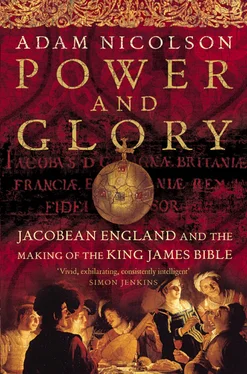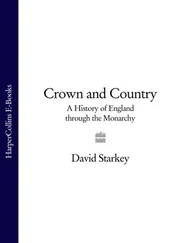The reign began with a month-long fiesta during which James was introduced to England and England to James. In London, the Secretary of State, little shrunken Robert Cecil, his back humped like a lute, his wry neck holding his head to one side, his twisted foot giving him an awkward stance, read out the proclamation of the new king at four in the morning in the Tudor palace at Richmond, at 10 a.m. at the ramshackle royal palace in Whitehall, then in great state at various places in the City of London. Cecil, subtle, secretive, immensely courteous and prodigiously hard-working, was at the heart of English government, as his father, Lord Burghley, had been before him. Both were royal servants intent on continuity and on the coherence of the state. They were merciless in the destruction of their enemies, against whom they deployed an array of spies, charm and money. Only when Robert Cecil died did the world discover the reality. He had sunk himself into almost irretrievable debt. He had plotted and misinformed against everyone. Through the impartiality of his courtesy and the ubiquity of his deceit, he had maintained his unrivalled position of influence. As his father had done with Elizabeth before her accession, Cecil had been in secret correspondence with James, via an intermediary, for two years.
In letter after letter, Cecil flattered and cajoled him, portrayed England as a place of civility and charm, a featherbed into which James could at last relax after all the stony travails of his Scottish youth. The warm and civilised care which Cecil lavished on the future king represented to James everything he hoped of England. And, of course, the letters portrayed Cecil himself as the indispensable gatekeeper who could usher James into the promised land. The Earl of Essex, before his disastrous rebellion and death in 1601, had been playing the same role. Once Essex was out of the way, Cecil had slid smoothly into position and now at last, with the queen dead, he could bring the secret arrangements to conclusion: he dispatched the English Privy Councilâs envoys to Scotland. They invited James âto repair into England with all speedâ.
âGood news makes good horsemenâ, and before James began his long progress south, a stream of interested Englishmen made their way to Holyrood, anxious to mould and influence the reign from its very beginning. Lewis Pickering, a Puritan gentleman from Northamptonshire, soon to be involved in the widespread manoeuvrings for the reform of the English Church, was one of the first to be admitted to Jamesâs presence. Would the king look more kindly than Elizabeth on the need to banish all papist practices from the English Church? Would the Reformation in England at last be made complete by the Calvinist king? Political to his core, James would not dream of giving more than a gracious answer. Dr Thomas Neville, envoy from the Archbishop of Canterbury, followed him. Neville was one of the most passionate opponents of extreme Puritanism, and of everything Pickering represented. Would the king stand firm for the House of Bishops against all the demands of the Presbyterian clergy in England? Would he support the status quo? Surely the last thing he wanted was to turn the English Church into anything resembling the church of John Knox and George Buchanan? Again, no answer. Others clustered in their sycophancy. Sir Oliver Cromwell, uncle of the regicide, came to pay his respects. âOne saith hee will serve him by daie,â the world-weary wit and courtier Sir John Harington wrote to a friend, âanother by night. The women are for servynge him both day and nighte.â
James requested cash from the Privy Council and it arrived by the coachload. They sent £5,000 in gold and £1,000 in silver. Jewellery for his Danish Queen Anne arrived from London (although not the Crown Jewels which were not allowed out of the country) as well as a selection of Elizabethâs hundreds of garnet- and pearl-encrusted dresses. Six geldings and a coach with four horses were dispatched to bring the king into England. On 5 April 1603, leaving his wife and children to follow him, James left Edinburgh for a journey through his new kingdom. It lasted over a month, spreading on through the beautiful spring weather into May. Nobility, gentlemen and chancers from north and south of the border accompanied him. It was a cavalcade. Most rode on horses. The wife of the French Ambassador was carried to London in âa chair with slingsâ, eight porters hired for the task, four to carry, four to relieve them.
The English turned out in their thousands to see the spectacle. James may have been unaware that the Privy Council had instructed them to do so and âif any shall be found disobedient, negligent or remisse therein, these are to let them know, that they are to sustaine such condigne punishment as their offense in that behalfe deservethâ. The gaiety had a whip at its back and the glittering pageant was an instrument of authority.
In Berwick-on-Tweed, all the guns of the border fortress town were fired at once. It was to be for the last time. The newly unified country needed no internal border fortresses and money could be saved if the garrison was dispersed. James was invited to fire one cannon himself. In Newcastle all prisoners were released except those in prison for âtreason, murther and papistrieâ. All those gaoled for debt had those debts paid off. James was hosing the money around him. In York a conduit ran all day with white wine and claret. At Worksop, the king was entertained to âexcellent, soule-ravishing musiqueâ by the Earl of Shrewsbury, who had hurried from Whitehall to meet him there.
James was nothing but bonhomie. The previously violent and lawless Scottish borders were to become, he announced, the âvery heart of the Countryâ in the new united empire of Great Britain, a phrase in use since the 1540s when Henry VIII and Edward VI had been anxious to unite England and Scotland, but now given a whole new Jacobean impetus. James had ordered new signets in which the rose and the thistle were to be intertwined. Unity and togetherness was his dream. An ensign for shipping was to be designed in which the Scottish saltire of St Andrew and the English cross of St George were to float side by side so that neither should have precedence over the other. There was to be a single currency in which the 20-shilling gold piece was to be called âThe Uniteâ, with âOur pictureâ on one side and âOur Armes Crownedâ on the other, emblazoned with the Latin motto Faciam eos in gentem unam , I shall make them into one nation. Here, in a practical and symbolic programme, the dream of authority and wholeness was, in Jamesâs vision at least, to become reality.
The new king would soon discover, however, that seventeenth-century Englishmen had about as much love for union, whether fiscal or political, as their modern descendants. The dream of unity â an abstract, intellectualised, Scottish and hence European ideal of political togetherness â would within a year fall foul of an English conservatism which valued its own hard-won freedoms far above any high-falutinâ ideas of political unity. England was England, the rosbifs dominated parliament, civilisation stopped at the Cheviots and the English Channel and ever, alas, would it remain so.
For the time being, life was a holiday. Largesse had been pouring in an unending fountain from Jamesâs hand. He had, in places, literally showered the streets with gold coins. Teams of the gentry were queueing up to be knighted, 237 of them in the first six weeks of the reign, 906 in the first four months, a sudden gush from the Fount of Honour, which under Elizabethâs last years had run virtually dry.
Then, on 21 April, as the pageant arrived at Newark in Lincolnshire, James made his first mistake. It was a bad one.
Читать дальше












